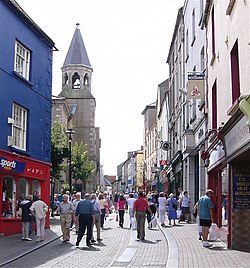Wexford
|
Wexford Loch Garman
|
||
|---|---|---|

Main Street, Wexford
|
||
|
||
| Motto: Per Aquam et Ignem 'Through Water and Fire' |
||
| Location in Ireland | ||
| Coordinates: 52°20′03″N 6°27′27″W / 52.3342°N 6.4575°WCoordinates: 52°20′03″N 6°27′27″W / 52.3342°N 6.4575°W | ||
| Country | Ireland | |
| Province | Leinster | |
| County | County Wexford | |
| Dáil Éireann | Wexford | |
| EU Parliament | East | |
| Elevation | 1 m (3 ft) | |
| Population (2011) | ||
| • Urban | 19,913 (20,072 with Environs) | |
| Irish Grid Reference | T051213 | |
| Dialing code | 053, +353 53 | |
| Website | www |
|
Wexford (Irish: Loch Garman [ˈl̪ˠɔxˈɡaɾˠəmˠən̪ˠ]) is the county town of County Wexford, Ireland. Wexford lies on the south side of Wexford Harbour, the estuary of the River Slaney near the southeastern corner of the island of Ireland. The town is linked to Dublin by the M11/N11 National Primary Route, and the national rail network connects it to Rosslare Europort. It has a population of 19,913 (20,072 with environs) according to the 2011 census.
The town was founded by the Vikings in about 800 AD. They named it Veisafjǫrðr, meaning "inlet of the mud flats", and the name has changed only slightly into its present form. According to a local legend, the town got its Irish name, Loch Garman, from a young man named Garman Garbh who was drowned on the mudflats at the mouth of the River Slaney by flood waters released by an enchantress. The resulting loch was thus named Loch Garman.
For about three hundred years it was a Viking town, a city state, largely independent and owing only token dues to the Irish kings of Leinster. However, in May 1169 Wexford was besieged by Dermot MacMurrough, King of Leinster and his Norman ally, Robert Fitz-Stephen. The Norse inhabitants resisted fiercely, until the Bishop of Ferns persuaded them to accept a settlement with Dermot.
...
Wikipedia


